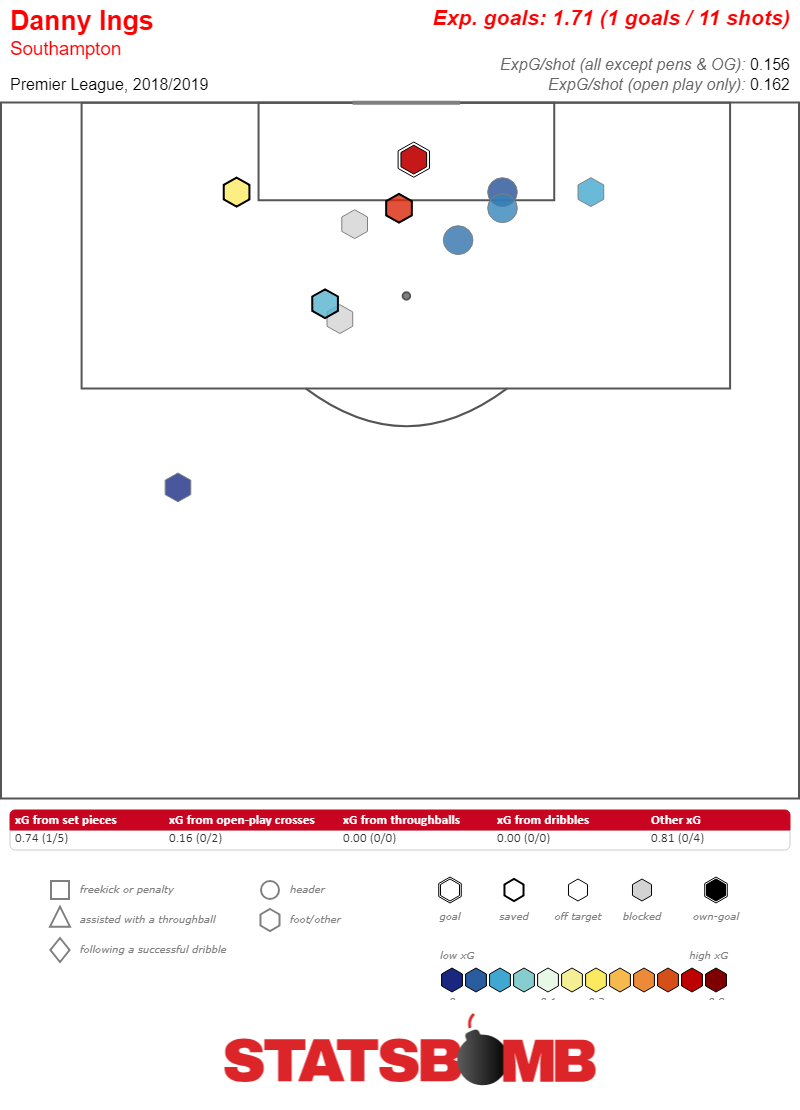It’s too early to draw conclusions. It’s not too early to pay attention. After three weeks here are a handful of numbers that jump out off the page and are worth paying attention to as the season marches on.
Danny Ings is Alive
It’s been a rough couple of years for Danny Ings. Bad luck, bad injuries and a bad fit largely kept him off the field for Liverpool. In two seasons he played a total of barely over 600 minutes. At 26 years old, he’s still got some good years left if he could just get out on the pitch and stay there. Well, so far so good at Southampton. He’s already played over 200 minutes this season, and things are going quite well thank you very much.
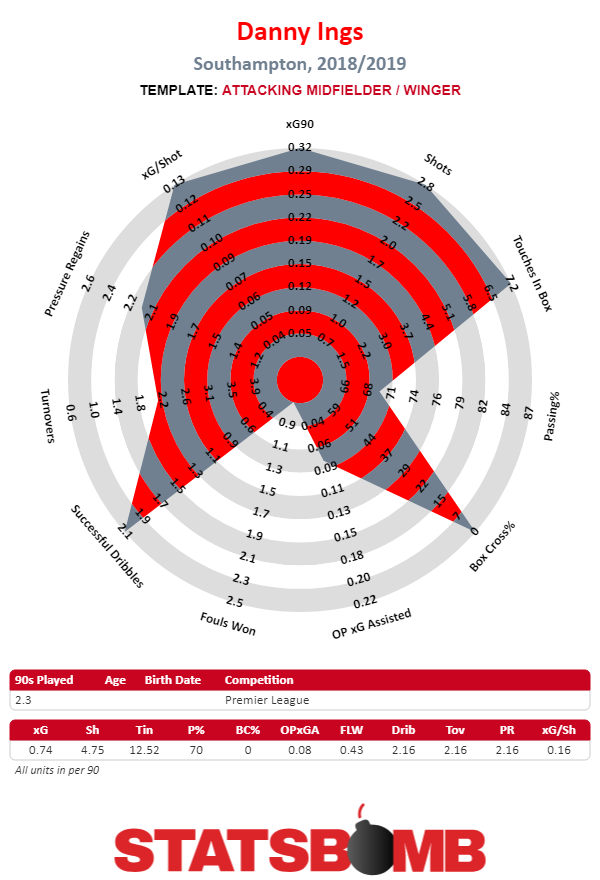
He’s fourth in the Premier League at this early stage with 0.74 expected goals per 90 minutes (of players with over 100 minutes). And he’s fifth in the league with 4.75 shots per 90 minutes. At only three games in, who a team has played is inevitably going to skew a team’s stats. And Southampton have face an interesting lineup of Burnley, Everton and Leicester City. That’s the solidly midtable clubs club, so those are three teams that probably aren’t terrible, although exactly how not terrible they are is still very much up for debate.
Ings’s hot start is going somewhat under the radar, because he’s only scored a single goal. But that shot chart is for real.
One of Southampton’s longest standing challenges has been finding a forward who can do the fundamental work of taking up strong attacking positions, getting himself free in the box and generating point blank goal scoring opportunities. So far, Ings fits that bill.
Hazard Keeps Dropping Deep
Chelsea have taken nine points from their first three games. The strong start to their season is even more impressive given that they’re still both adapting to new manager Maurizio Sarri’s system and also working players back into the rotation. Expect them to get even better as players continue to adapt to what Sarri wants them to do.
One particular example is Eden Hazard. After coming on as a substitute for the opening two games, Hazard made his first start against Newcastle. The winger is currently fourth in the league in deep progressions per 90 minutes with 14.09 per game. That’s not a bad thing, but it’s also not really the way Sarri’s system is supposed to operate. Chelsea have an overabundance of passing in their back seven. That’s supposed to help the attacking players stay further up the field rather than force them to drop back into midfield. It’s a marked change in roles for Hazard who spent his time under both Jose Mourinho and Antonio Conte being asked to use his prodigious skills to drop into deep areas receive the ball and embarrass defenders as he ran transition.
He’s still doing that. His contributions are still slanted towards contributing in the middle third of the pitch, unsettling defenses and bringing the ball forward. As such, he’s not getting himself into the box for shots quite yet. The shot chart remains barren. As Hazard continues to work himself back into the team, look for him to do somewhat less creating and a lot more attacking.
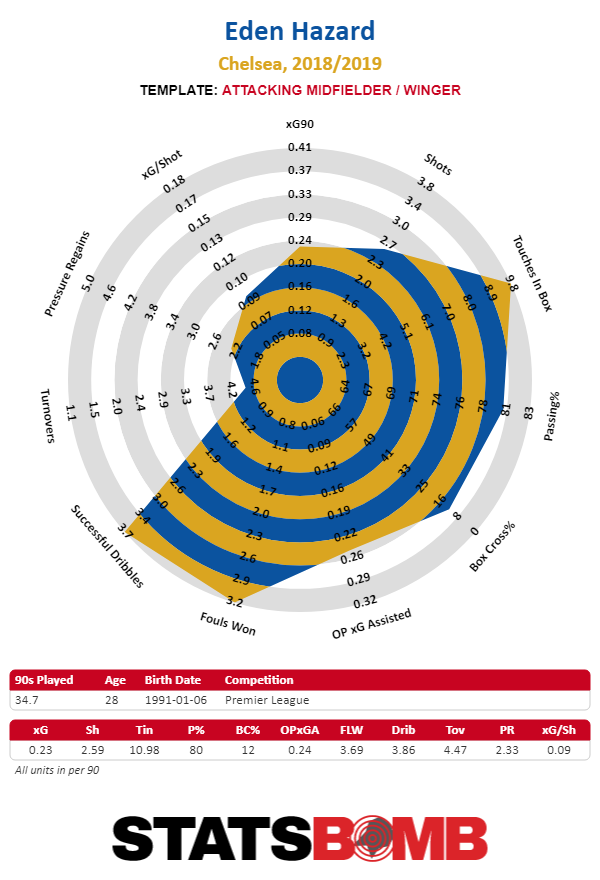
Pascal Groß Pressing Machine
Pascal Groß is a one man defensive pressing whirlwind. He’s averaging 51.43 pressure per 90 minutes. Nobody else in the Premier League is averaging even 35 (among players with more than 100 minutes on the pitch). To some degree this is a schedule effect. Brighton have already played Manchester United and Liverpool in addition to Watford although Groß was on the bench at Anfield and didn’t come on until the 80th minute. Still, his sheer level of activity on the defensive side of the ball is breathtaking.
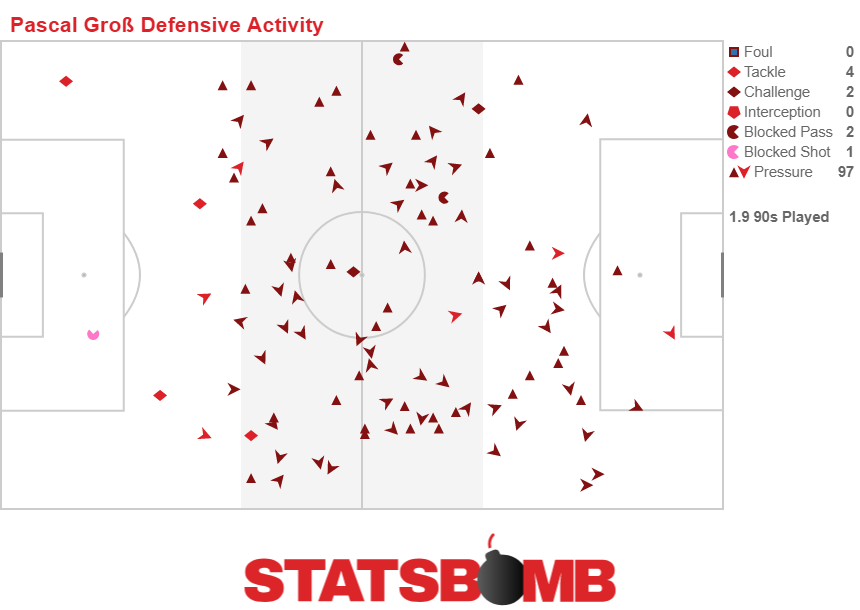
That numbers is bound to come back to earth. Nobody who played more than 1000 minutes last season in the Premier League averaged more than 28 pressures. Last year, Pascal Groß himself averaged 24.48. That number was seventh best in the league. As Brighton plays worse teams, they’ll have the ball more and they’ll spend less time chasing the opposition. When that happens Groß’s ability on the ball will be more important than his never-ending motor when the opposition has it. Still, as Brighton enter their second season, the two way ability of Pascal Groß remains one of their keys to success. Thus far this year, he’s been an unparalleled defensive machine.
Andre Schurrle Really Likes to Shoot
Some players shoot the ball a lot. Some players REALLY shoot the ball a lot. And then there’s Andre Schurrle. Fulham’s winger simply cannot stop shooting. Usually that would be a good thing. In this case, it’s not. Schurrle is averaging 6.16 shots per 90 minutes, which leads the league (among players with more than 100 minutes of playing time). The problem is, he’s also averaging only 0.25 xG per 90, the 31st highest total. He’s averaging 0.04 xG per shot. That’s tied for the lowest xG per shot of any player averaging over a shot per game.
Taking bad shots is not, necessarily, a problem on its own. Players who shoot the ball relatively rarely, or primarily from set piece situations, will often have a relatively weak shooting profile. Tottenham’s Christian Eriksen, for example, is also averaging 0.04 xG per shot. He’s also taking less than half the shots per 90 minutes that Schurrle is. But, if you’re a forward, and your job is to shoot, you want to be getting better shots than Andre Schurrle is. There’s a whole lot of blue going on here.
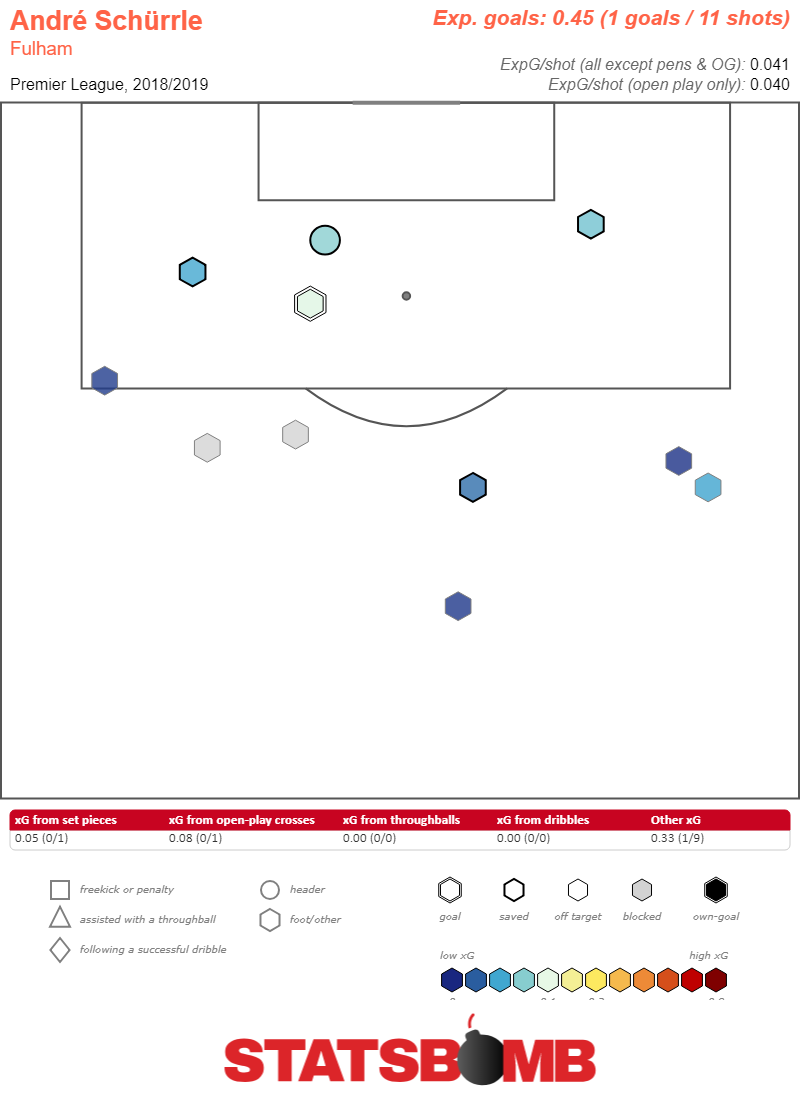
In Fulham’s match against Burnley, Schurrle took an astonishing nine shots. He scored on his last one. Part of the reason it took so long, of those nine shots four of them had an xG of 0.01. That’s not good! Schurrle, right now, is the rare example of a high volume shooter who is hurting his team more than he's helping them. But, there’s a reason those examples are rare. Either, Schurrle’s shot selection will improve, or he’ll probably end up riding the bench. Shooting a lot, in theory, is good, but not when you’re doing it from the moon.
